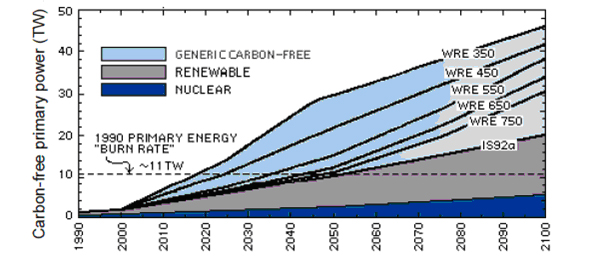The journalist Jeff Goodell asked me for some comments about Trump and his decision to not honor climate pledges made by the United States. In lightly edited form, this is what I replied, largely as stream-of-consciousness writing:
The United Nations Framework Convention on Climate Change (UNFCCC) was adopted on 9 May 1992, just over 25 years ago. The Convention was signed by then-President George H. W. Bush. The UN Framework Convention was negotiated by a Republican Administration.
In signing the Convention, President Bush spoke of “crucial long-term international efforts to address climate change”, and said “I am confident the United States will continue to lead the world in taking economically sensible actions to reduce the threat of climate change.”
Nearly 20 years ago, Marty Hoffert and I, with other colleagues, published the first peer-reviewed study outlining how much carbon-emission-free energy we would need to support economic growth while protecting our environment. So far, the world has done about one-tenth of what we projected would need to be done by now.

Fig. 1. Hoffert et al., (1998) estimated that by now, nearly half of our primary power would need to come from sources that do not dump carbon dioxide pollution into the atmosphere. Even with the most generous accounting, less than 20% of our energy comes from such sources today.
I am confident that history will come to look upon the Trump Administration and his congressional co-conspirators as dark stain on American history, as a failed effort by regressive forces to return to a world that never was.
Trump and his Republican co-conspirators will be swept aside by demographic trends.
I have to believe that what is good in America will reassert itself. Compassion, tolerance, respect, and caring for others will supplant greed and fear-mongering.
With this resurgence of positive spirit, expressed through our newly restored political institutions, we will reach a national consensus that nothing can really be good for America if it is not also good for the rest of the world.
The United States will lead an energy system transition, and build a new economy with new jobs, and create an energy system that can promote economic growth while protecting natural assets.
After the Dark Ages, came the Renaissance.
We are in our political Dark Ages, but there will be a political Renaissance.
The ascent of Trump and his cohort, with all their foolish actions, are but a temporary setback. They cannot for long hold back the forces of history.
The global historical trends show people lifted out poverty, with better education, better health care, becoming more tolerant, and taking better care of the environment. These trends will continue.
Yes, there are setbacks, driven by fact-denying forces both at home and abroad, but these setbacks do not undermine broader historical trends.
The political survival of the Republicans and Democrats alike will depend on embracing these trends.
It is important that thinking, caring Americans make it clear that Trump is an aberration; he is the noise and not the signal. Our system will self correct. America will be great again.
The Democrats share responsibility for Trump and his misguided policies. They have not fought for policies that help the average person whose job is threatened by automation or globalization. They too have failed to put in place policies that recognize the magnitude of the energy system transformation that lies before us.
If two good things can come out of the Trump Administration, they will be (1) undermining the Republican Party by exposing them as craven, venal and unprincipled, and (2) re-invigorating the Democratic Party to fight for policies that are as ambitious as the problems that face us are large; these problems include health care, education, employment, and the challenge of radically transforming our energy system.
The reckless and ignorant actions undertaken by the Trump Administration are but a temporary setback. It is important to keep in mind that addressing the climate problem will involve a century-scale energy system transition, and that we have already let the clock run for a quarter-century without getting very far from the starting gate.
The United States, along with the rest of the world, will be building an energy system that does not rely on using the sky as a waste dump for our CO2 pollution.
For now, the rest of the world (and the states and non-government actors) will have to make progress without support from the White House. The next Presidential Administration will have to work harder to make up the ground we are losing now.
